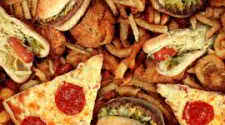High Fat Diets: Is Higher Fat intake better for Fat Burning?

Advanced Supplements & Health Science
Vince Gironda, a renowned bodybuilding trainer who tutored, among others, Larry Scott, the first Mr. Olympia (1965-1966), and Don Howorth, IFBB Mr. America (1967), used to say that you must consume fat to burn fat. From a nutritional standpoint, that was heretical statement to
make in the '60s and remains so today. Most mainstream nutrition authorities say that eating fat makes you fat far more so than either carbohydrates or protein. This theory relates to the caloric content of dietary fat, which on a gram-for-gram basis is more than double (nine)
that of carbs (four) or protein (four). Gironda's assertion that fat burns fat was based primarily on empirical experience gained from years of training himself and others. He insisted that the most efficient fat-burning diet involves reducing carbohydrates and consuming foods
relatively high in fat. This included not only fat occurring naturally in high-protein foods, such as meat and eggs, but also from supplemental farms of fat, such as certain types of unsaturated oils.
Based on recent findings, it appears that Gironda might have been on the right track. In a study published in the European Journal of Applied Physiology (74:13-22, 1996), scientists examined what happens when animals are rotated between high-carb and high-fat diets. The protocol
used in this research is especially relevant to bodybuilders because it mimics their popular formula of low-carb, high-fat diets followed by the reverse. The purpose of the research, which involved untrained tab rats, was to observe the effects of a short-tent change from a
high-fat to a high-cart diet on glycogen use and storage, and on intramuscular fat stores, The researchers put groups of rats on either high-fat or high-carb diets for 28 days, then switched the diets and observed the metabolic and fuel-use changes. Also included were exercise
protocols (swimming for one and a half hours).
Prior studies had found that switching from a high-fat to a high-carb, diet enhanced glycogen repletion after exercise. This effect is caused by increased activity in the muscle enzyme (glycogen synthase) that controls glycogen synthesis. Another benefit was a glycogen-sparing
effect, the result of greater intramuscular fat oxidation (burning) due to the animals' higher dietary-fat intake (i.e., fat was burning fat). In still other research, it had been shown that consuming a high-fat diet leads to changes in mitochondna, the portion of the cell in
which fat is oxidized. When a high-fat diet is combined with exercise, those mitochondrial fat-oxidation enzymes become more active. The result is increased use of both fats and carbs for energy during exercise. The new EJAP study reported another interesting finding. When the
rats were shifted to the high-carb diet after their 28-day high-Fat diet, the animals' ability to burn fat was not hindered in any way.
In fact, their fat-burning capacity increased because the number of beta-adrenergic receptors had increased. These receptors, when turned on by an enzyme called hormone-sensitive lipase, release fat from fat cells. Thus, consuming carbs after a period of relatively low-carb and
high-fat intake not only increases glycogen restoration in muscles and liver but also appears to enhance fat-burning capacity as well. This upgraded fat oxidation, in turn, preserves vital intramuscular energy reserves (glycogen and intramuscular fat), thus allowing longer and
more intense training sessions. Although this new research appears to argue persuasively for a diet higher in fat for bodybuilders and other active athletes, it's important to note that the study involved rats, which burn a different preferential fuel mixture than humans. Rats
rely mare on visceral bodyfat and circulating blood glucose; human exercise metabolism focuses on intramuscular fat stores and muscle glycogen.
Further studies are necessary to conclusively prove the effects of a high-fat diet in humans, It is already an established fact, though, that exercise can increase the activity of fat-burning enzymes. This in turn spares vital - and limited - supplies of muscle glycogen.